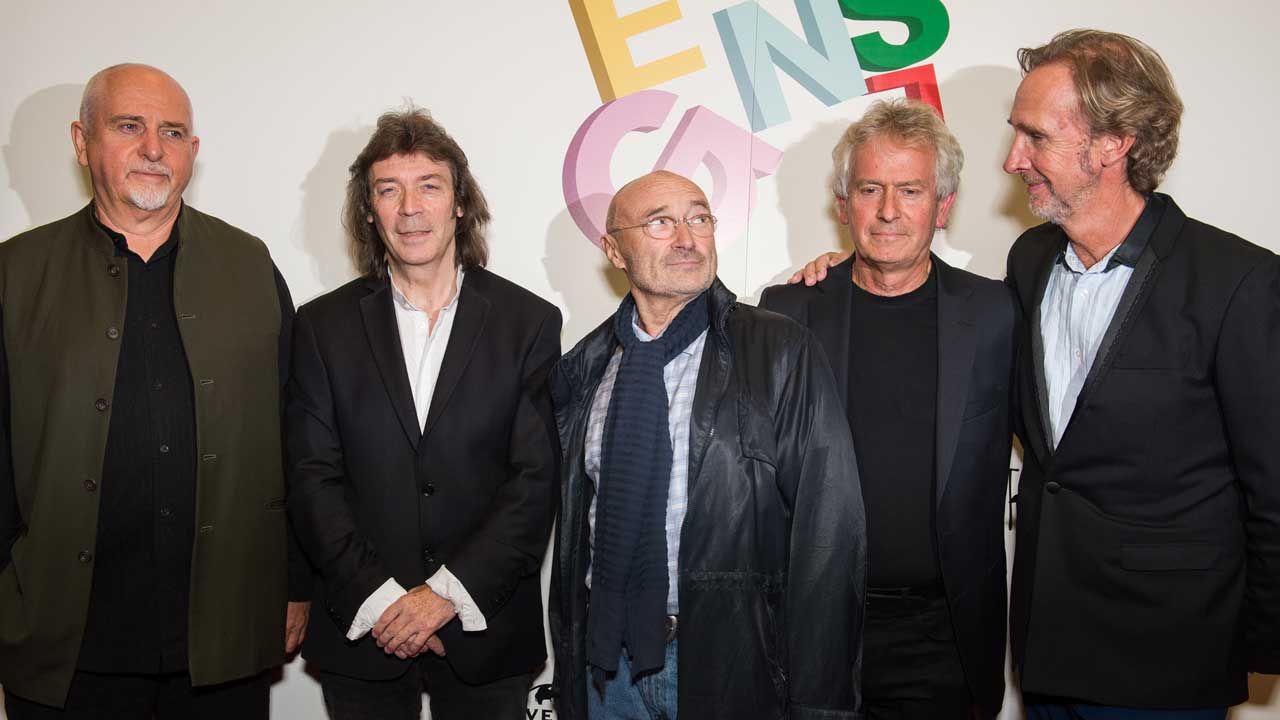"A five-piece Genesis was never going to last, there were too many writing ideas": When Genesis reunited to make a film, it was the same old story
Tony Banks and Mike Rutherford look back on the controversial Genesis documentary Sum Of The Parts

At the end of 2014, Classic Rock talked with Genesis members Tony Banks and Mike Rutherford about that year's controversial documentary Sum Of The Parts, a film that saw the the band's classic lineup working together again. Perhaps unsurprisingly, it seemed no one was happy with the result.
Given that they’re no longer a going concern, Genesis have been unusually busy in 2014. First came R-Kive, a three-CD anthology curated by the band. It was the first Genesis compilation to also make room for songs from the respective solo work of the classic line-up of Peter Gabriel, Tony Banks, Mike Rutherford, Phil Collins and Steve Hackett.
Then there was the documentary Sum Of The Parts, an accompanying DVD that was first broadcast (in truncated form and under the title Genesis: Together And Apart) by the BBC in October.
The film includes contributions from all of the above members, assembled together in one room earlier this year. But it provoked criticism from many fans over its revisionism and the absence of any mention of guitarist Steve Hackett’s solo career.
Then again, as Mike Rutherford and Tony Banks admit, life in Genesis wasn’t always harmonious.

What was it like to reunite for the documentary?
Tony Banks: I’ve seen everybody individually over the years, so it was fun to have us all in the same room. Nothing sensational came out of it, but we had fun bickering about who did this and that and who caused most of the problems. Most of them seemed to think I was the biggest problem – which I wouldn’t deny. I was a bolshy kind of person and tended to get my own way.
Sign up below to get the latest from Classic Rock, plus exclusive special offers, direct to your inbox!
Mike Rutherford: I had to prove that it was justified doing it. The general public sometimes don’t know that Phil played drums, that Peter was in the band or that I’m in Mike + The Mechanics, so it seemed to be a good reason for making a documentary. We agreed from the word go that in order to make it work we all had to be in the same room at the same time.
Did the documentary work out as you’d hoped?
TB: It concentrated heavily on the early period, but I could’ve done with more on the solo stuff. Especially when it comes to Steve [Hackett], who didn’t really feature in the solo section, which is wrong. And there’s no mention of Calling All Stations [1997, and the final Genesis album recorded with vocalist Ray Wilson].
Mike, in your autobiography, The Living Years, you say that Genesis was a democracy in theory. How well did it work in practice?
MR: Towards the end there were only three of us and we were less resistant to approving things. But when we were younger we were fighting to prove how good, how brilliant and special we were. A five-piece Genesis was never going to last, there were too many writing ideas.
TB: It was pretty much a democracy. Mike’s book is all lies, particularly in relation to me. I thought he was a bit unkind to me, just generally quite dismissive. I told him so and he admitted a certain amount of it. He also changed a few stories so that he’d look better than I did. But it’s fairly accurate.
Genesis have a reputation for being po-faced. Do people still tend to have a false perception of you?
MR: Oh yeah. They think that we were very serious. But our approach was always to sort of get in and bang it around. It’s not cerebral. You always imagine Tony as a classically trained thinker, but he’ll jam and make some horrendous noises.
TB: We always liked humour. Peter was quite good at a subversive kind of humour – Harold The Barrel and Willow Farm, stuff like that. I think he was more responsible for that element in the early days. It’s one of those things that a lot of groups, particularly the early progressive ones, didn’t really tend to have.
When I Know What I Like (In Your Wardrobe) became Genesis’s first hit, in 1974, did you feel like you’d finally landed?
MR: We’d all grown up with hit singles. Then there was a weird divide in the late sixties and early seventies: you were either an album act, like us, or you were a pop act, like Pickettywitch or Mud. There was no middle ground. I Know What I Like cheered up our manager at the time, but we turned down Top Of The Pops. It just felt wrong to do.
TB: In terms of singles, Follow You Follow Me was our first proper hit [it reached No.7 in the UK 1978]. That was fun, because for the first time a whole section of the public became aware of us. Suddenly we were on the radio and started getting more females at the shows.
Some online fan forums were lukewarm about R-Kive, viewing the tracklisting as overly safe.
TB: I agree. I’d like to have had more variety. But although it is for the fans, to some extent it’s for a slightly wider audience who don’t really know so much about us. It gives them a chance to hear those other songs in context.
Having compiled R-Kive, did you discover anything new about Genesis?
TB: I’m beyond surprise when it comes to Genesis. Though sometimes you read interviews from people at different moments in their careers. Having decided to make himself look as unattractive as he could in the later Genesis period, Peter went through a time where he made himself look as pretty as possible. And he capitalised on that. You see him interviewed at that point and he’s a slightly different guy. Phil went through lots of periods when his confidence rose, too, especially around the time of [Collins’s 1985 solo album] No Jacket Required. People change.
Any regrets about any of it?
MR: In the early eighties we were the biggest touring band in the world for two or three years. But you never go: “Wahay, this is it!” Though I kind of wish I had done that a bit more. In life you never realise that that moment in time is a pretty special one, because you’re so busy working.
TB: I would’ve liked more success as a solo artist. I felt [1979 solo album] A Curious Feeling deserved more recognition than it got. But then I had fantastic recognition within Genesis. I’ve had it far more than most people get. I really couldn’t have wished for more from a professional career.
This feature originally appeared in Classic Rock 205, published in December 2014.
Freelance writer for Classic Rock since 2008, and sister title Prog since its inception in 2009. Regular contributor to Uncut magazine for over 20 years. Other clients include Word magazine, Record Collector, The Guardian, Sunday Times, The Telegraph and When Saturday Comes. Alongside Marc Riley, co-presenter of long-running A-Z Of David Bowie podcast. Also appears twice a week on Riley’s BBC6 radio show, rifling through old copies of the NME and Melody Maker in the Parallel Universe slot. Designed Aston Villa’s kit during a previous life as a sportswear designer. Geezer Butler told him he loved the all-black away strip.
You must confirm your public display name before commenting
Please logout and then login again, you will then be prompted to enter your display name.



